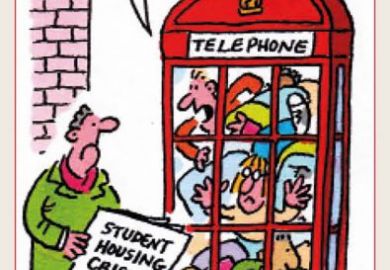
Autumn in UK higher education these days usually means a glut of stories about student accommodation woes and 2019 is no different. After news emerged in recent weeks that some students at the University of Bristol were commuting from over the Welsh border because of a lack of space, it is the turn of the city’s other institution, the University of the West of England, to make headlines. According to The Times, some new students have been living in 8ft by 10ft “pods” that were “hastily installed” in a car park to meet increased demand. Naturally, their inhabitants haven’t warmed to their new homes, with one calling it “not an appropriate living standard for a human being”. However, the pods at least seem rodent-free – something that couldn’t be said for one Coventry University hall of residence, where a rat problem has forced some students to move into temporary digs, according to news site The Tab.
Perhaps the Coventry rats need to be given something better to do, such as drive small plastic cars. That seems to be the strategy at the University of Richmond in the US, which has taught a group of 17 rats how to drive such vehicles for an experiment into mental health, the BBC reported. Researchers at the institution found evidence that the rats were less stressed as a result of learning to drive the cars, a finding that they hope could prove useful in creating more effective treatments for some mental illnesses. However, although the creation of the ratmobiles is a clear leap forward for rodentkind, it is not clear what kind of results might have emerged if the rats were asked to drive their cars around a four-lane motorway orbiting a major city each day alongside millions of other rats. After such an experience, they might be desperate to leave the rat race behind.
Times Higher Education went to press awaiting the results of UK higher education workers’ ballot on potential strike action over pensions and pay. Since 9 September, University and College Union members at 69 institutions have been voting on whether they should once again go on strike over changes to pensions offered by the Universities Superannuation Scheme, which saw them walk out for 14 days last year. A ballot on pay, workloads, casualisation and equality has been running at the same time at those institutions, as well as at 78 more. The ballots will be disaggregated so each institution will be polled separately. UCU’s higher education committee was expected to meet on 1 November to discuss action following the results. If the pensions ballot is successful, the HEC has discussed taking up to 14 days’ strike action from the beginning of November. According to UCU, there is also the option of marking and assessment boycotts.
Students at a liberal arts college in the US said that they were told to stay in their dorm rooms during a visit to the campus by Donald Trump. According to The State newspaper, the campus at Benedict College in Columbia, South Carolina, underwent a lockdown as the US president gave a speech about criminal justice to about 300 people. One student said they were “pretty much being told to stay in our dorms” while the newspaper said it had also spoken to student protesters who said that they were told not to leave their rooms. A college spokeswoman said that asking students to stay in their rooms was part of a safety plan for the president’s visit. However, “if anyone needed to go to work or to another building, it was not a problem”, the spokeswoman said.
J.K. Rowling, creator of one of the world’s most famous orphan characters, has urged students around the world not to volunteer at orphanages. Speaking at the One Young World summit in London, the Harry Potter author said that “orphanage tourism” does more harm than good, because it drives family separation and trafficking, according to The Guardian. Travelling while “doing good” – or “voluntourism” – has become a staple of many students’ experience before, during or after university but has faced growing backlash in recent years. According to the charity Lumos, one in five UK students has visited or volunteered at an overseas orphanage and the majority of students believe that this form of volunteering would enhance their CV or career prospects. However, “the sad truth” is that this multibillion-dollar industry “separates children from their families and puts them at risk of neglect and abuse”, Ms Rowling said.
Register to continue
Why register?
- Registration is free and only takes a moment
- Once registered, you can read 3 articles a month
- Sign up for our newsletter
Subscribe
Or subscribe for unlimited access to:
- Unlimited access to news, views, insights & reviews
- Digital editions
- Digital access to THE’s university and college rankings analysis
Already registered or a current subscriber?





